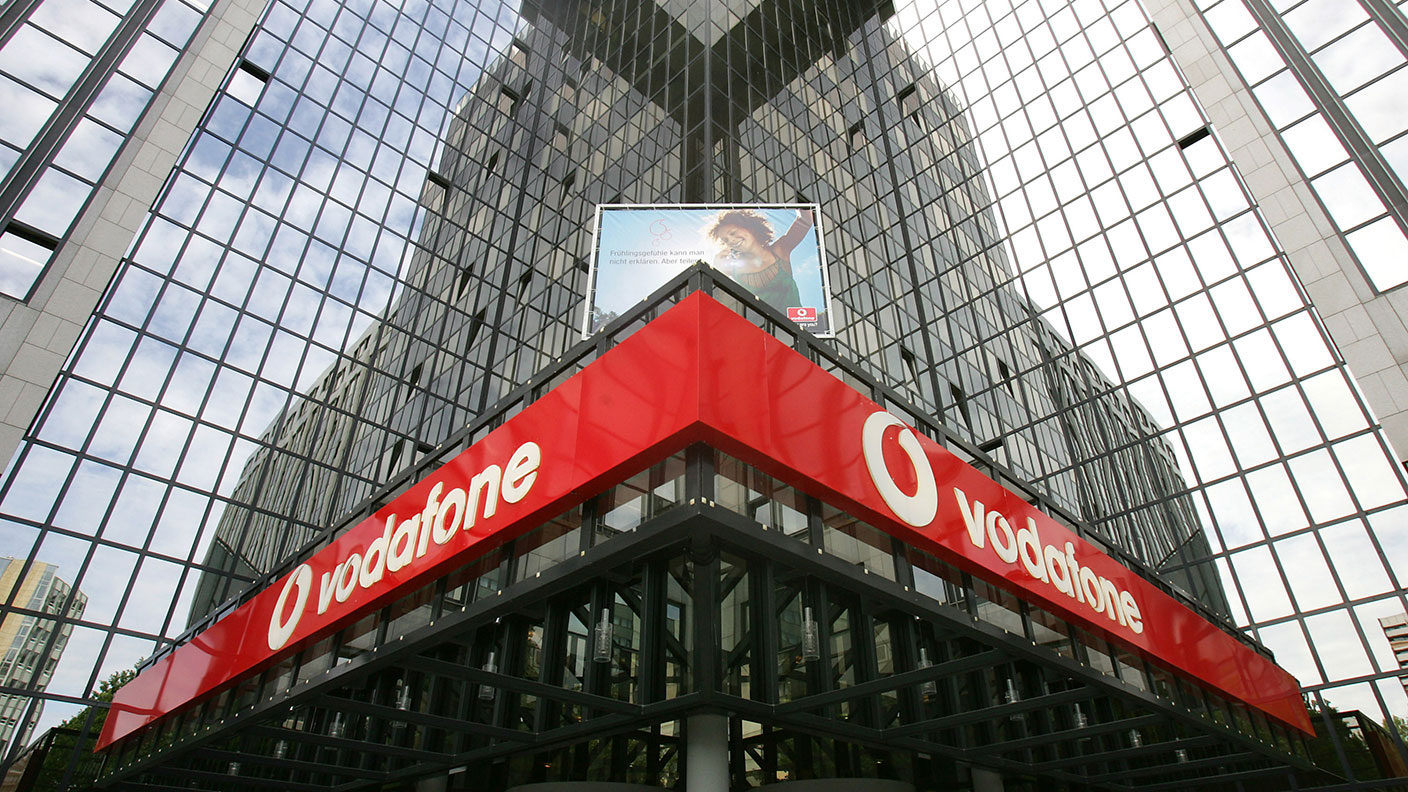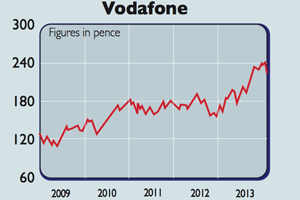Which companies will benefit most from Vodafone’s cash bonanza?
Vodafone shareholders are about to get a windfall. Ed Bowsher looks at how this will affect the markets, and how you could take advantage.

Get the latest financial news, insights and expert analysis from our award-winning MoneyWeek team, to help you understand what really matters when it comes to your finances.
You are now subscribed
Your newsletter sign-up was successful
Want to add more newsletters?

Twice daily
MoneyWeek
Get the latest financial news, insights and expert analysis from our award-winning MoneyWeek team, to help you understand what really matters when it comes to your finances.

Four times a week
Look After My Bills
Sign up to our free money-saving newsletter, filled with the latest news and expert advice to help you find the best tips and deals for managing your bills. Start saving today!

Vodafone shareholders are about to receive a major cash injection.
That's because their payoff from the Verizon Communications deal begins today.
In return for selling Vodafone's stake in US mobile operator, Verizon Wireless, shareholders will receive roughly £50bn in cash and shares in Verizon Communications.
MoneyWeek
Subscribe to MoneyWeek today and get your first six magazine issues absolutely FREE

Sign up to Money Morning
Don't miss the latest investment and personal finances news, market analysis, plus money-saving tips with our free twice-daily newsletter
Don't miss the latest investment and personal finances news, market analysis, plus money-saving tips with our free twice-daily newsletter
Shareholders will probably use most of the money to buy shares in other companies, so we may see some significant moves in share prices over the next few weeks.
And certain shares look set to benefit a lot more than others here's how you could take advantage
How should you invest your Vodafone payout?
The Verizon shares will be credited today, the cash will be paid over the next fortnight.
The deal is sizeable enough that some people have referred to it as Corporate QE,' after the Bank of England's money-printing scheme. The idea is that a lot of this money will go back into stocks, boosting the beneficiaries. And it might even give a lift to the economy. After all, some Vodafone shareholders may decide not to reinvest their cash, and spend it instead.
So is there a way we can profit from all this?
If you're about to receive some shares in Verizon Communications, my advice would be to sell them. The company looks fairly valued, and it's carrying a lot of debt.
But what should you do with the money? You may be tempted to invest some of the cash back into Vodafone.
I can see the attraction of that. The company is a potential bid target, it has a sizeable emerging markets business, and it pays a decent dividend. However, my concern with Vodafone is that, apart from Germany, it's a mobile pure-play. In other words, it just provides services for mobile phones.
That's a problem because that's not the way the market is going. More and more customers across Europe are buying their mobile, broadband and pay-tv from the same supplier, and Vodafone can't supply those customers.
Having bought a major German cable company last year, my worry is that Vodafone may want to buy more cable businesses soon. And it may overpay.
Institutional investors don't have any choice
Many active managers will also be obliged to sell, as a US share won't fit their mandate. Again, if you're running a UK equity fund, that doesn't leave room to hold Verizon.
So where will the institutions invest their spare cash instead?
The passive fund managers will end up putting most of their money in the largest stocks in the FTSE 100. That's the way passive tracker funds work the most money goes to the largest stocks. For the record, here are the current ten largest companies in the index:
| Royal Dutch Shell | £150bn | 4.58% |
| HSBC | £122bn | 5.06% |
| Vodafone | £111bn | 4.55% |
| BHP Billiton | £105bn | 3.57% |
| BP | £92bn | 4.38% |
| GSK | £81bn | 4.63% |
| Unilever | £69bn | 3.73% |
| Rio Tinto | £66bn | 3.2% |
| British American Tobacco | £59bn | 4.37% |
| Royal Bank of Scotland | £58bn | - |
So we may see a modest share price boost for these big FTSE companies. However, you can't assume this is a sure thing. If, say, the US markets start falling for whatever reason, I doubt the Vodafone cash will prevent similar declines in London.
Are there any better bets out there? Well, the more active managers may use their Vodafone cash to buy other large high-yield companies in London. Most of those who own Vodafone have likely been drawn to it at least partly for the dividend. If they're going to redeploy cash elsewhere, they'll be looking for other high yielders.
| SSE (LSE: SSE) | £13.8bn | 5.99% |
| Resolution (LSE: RSL) | £5.3bn | 5.99% |
| Centrica (LSE: CNA) | £16.3bn | 5.3% |
| HSBC (LSE:HSBA) | £123bn | 5.06% |
| Morrison (LSE: MRW) | £5.6bn | 5.02% |
| BAE Systems (LSE: BA.) | £13.1bn | 5.02% |
| Imperial Tobacco (LSE: IMT) | £22.9bn | 4.93% |
| National Grid (LSE: NG) | £31.1bn | 4.89% |
| Sainsbury (LSE: SBRY) | £6.7bn | 4.82% |
| British American Tobacco (LSE: BATS) | £14.6bn | 4.7% |
So we may see shares in the above companies benefit from Vodafone's big payout.
Obviously, I wouldn't buy any of these solely on the hope that a bit of money from Vodafone will make its way to these stocks. But if you've had your eye on any of them, now might be a good buying opportunity.
Of the ten, I'm most drawn to BAE and Imperial Tobacco. Granted, many countries are cutting their defence budgets, which isn't good news for an arms business such as BAE. But the company trades on a price/earnings ratioof less than ten, and has a strong balance sheet. And governments will still want arms for as long as I'm on this earth.
As for Imperial Tobacco, it appeals because it has a large number of customers who are addicted to its products. Sure, e-cigarettes pose a threat, but I'm pretty sure that many folk will stick with their traditional tobacco fix. You can read more analysis on the tobacco sector from my colleague Phil Oakley. If you're not already a subscriber, you can get your first three issues free here.
Our recommended articles for today
The best way to get rich
Britain is pulling out of investment banking and so it should
The City should go back to what it used to do well, says Matthew Lynn and forget about investment banking.
Get the latest financial news, insights and expert analysis from our award-winning MoneyWeek team, to help you understand what really matters when it comes to your finances.
Ed has been a private investor since the mid-90s and has worked as a financial journalist since 2000. He's been employed by several investment websites including Citywire, breakingviews and The Motley Fool, where he was UK editor.
Ed mainly invests in technology shares, pharmaceuticals and smaller companies. He's also a big fan of investment trusts.
Away from work, Ed is a keen theatre goer and loves all things Canadian.
Follow Ed on Twitter
-
 Average UK house price reaches £300,000 for first time, Halifax says
Average UK house price reaches £300,000 for first time, Halifax saysWhile the average house price has topped £300k, regional disparities still remain, Halifax finds.
-
 Barings Emerging Europe trust bounces back from Russia woes
Barings Emerging Europe trust bounces back from Russia woesBarings Emerging Europe trust has added the Middle East and Africa to its mandate, delivering a strong recovery, says Max King
-
 Vodafone shares yield more than 6% – should you buy, or steer clear?
Vodafone shares yield more than 6% – should you buy, or steer clear?Analysis Vodafone grew revenue by 4% and profit by 11% last year, and offers investors a 6.4% dividend yield. So should you buy Vodafone shares? Rupert Hargreaves looks at the numbers.
-
Are your dividend payments at risk?
Tutorials Vodafone cut its dividend payment by 40% earlier this month. How can you avoid similar disappointments?
-
 How to protect yourself from dividend disappointment
How to protect yourself from dividend disappointmentTutorials Vodafone just cut its dividend. And it’s not the only company on shaky ground. John Stepek explains what’s so great about dividends, and how to protect your portfolio from dividend cuts.
-
Vodafone takes fight to BT
News Telecoms giant Vodafone has vowed to take on BT in the broadband and television market.
-
 Company in the news: Vodafone
Company in the news: VodafoneTutorials If you own shares in Vodafone, you're in for a big pay-out. Phil Oakley explains how it will work, and what you should do next.
-
Company in the news: Vodafone
Features Vodafone shareholders are in for big windfall following the deal with Verizon. But once the money's paid out, are the shares worth keeping? Phil Oakley investigates.
-
Vodafone’s $130bn deal
News Mobile-phone giant Vodafone has sold its stake in Verizon - the biggest deal for a decade.
